In today's complicated regulatory climate, companies are under a lot of pressure to follow strict rules in important areas like ethics and cybersecurity. The good news? Modern cloud-based learning platforms offer adaptable solutions to these issues, helping businesses reduce risk and train their teams.

What is compliance training?
As the name suggests, compliance training ensures that employees are equipped with the knowledge required by law, industry, or the organization. Compliance training can include skills, safety, or behavioral instruction, and may take the form of initial or refresher courses.
To provide an authoritative definition, GoSkills consulted Megan Torrance, CEO and founder of TorranceLearning. With more than 25 years of expertise in learning strategy and design, Megan's perspectives are extremely beneficial for compliance training.

Her work on "How to Make an Impact with Risk-Based Compliance Training" alongside Ingrid Fredeen of NAVEX, a significant provider of GRC platforms, demonstrates her experience. In Torrance's view, compliance training encompasses more than just fulfilling a requirement:
"Compliance training is far more than a checkbox; it's a fundamental pillar for establishing and reinforcing an organization's values, ethics, and responsibilities.
Compliance & other required training aren’t going away: our challenge is to integrate them into the overall learning program as a vital cultural touchpoint.
These efforts can fortify an organization's internal messaging while ensuring critical content truly sticks through effective, right-sized approaches like microlearning and learning in the moment of need."
— Megan Torrance, CEO and Founder of TorranceLearning.com
From her perspective, compliance training is a vital cultural touchpoint rather than just a checkbox. Building on her point, effective delivery is paramount. This is where Learning Management Systems (LMSs) come in.
10 Best compliance training LMS platforms
Many businesses, like cosmetics and pharmaceuticals, need special training platforms to meet strict regulatory requirements.

Others benefit more from flexible LMS platforms that can be tailored to their specific compliance training needs. Here are some of the top general-purpose compliance training platforms worth considering:
1. GoSkills LMS
GoSkills offers a modern, easy-to-use LMS made just for small and medium-sized organizations. It simplifies advanced learning technologies with a built-in course library, ready-to-use compliance training templates, an AI-powered course builder, and easy-to-understand reporting, allowing administrators to stay informed about what is happening in their L&D program.
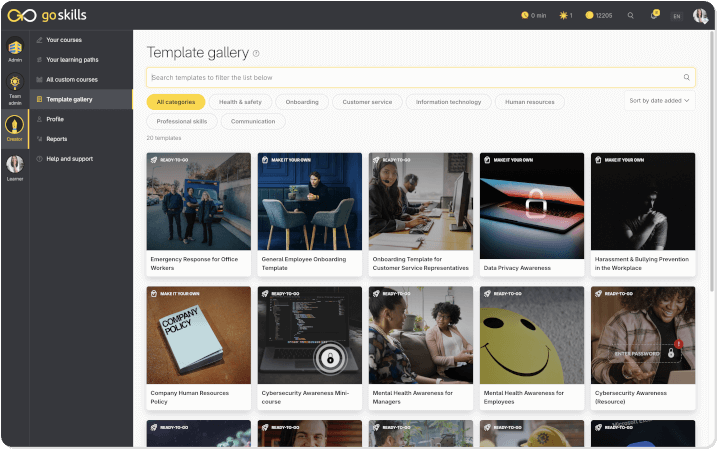
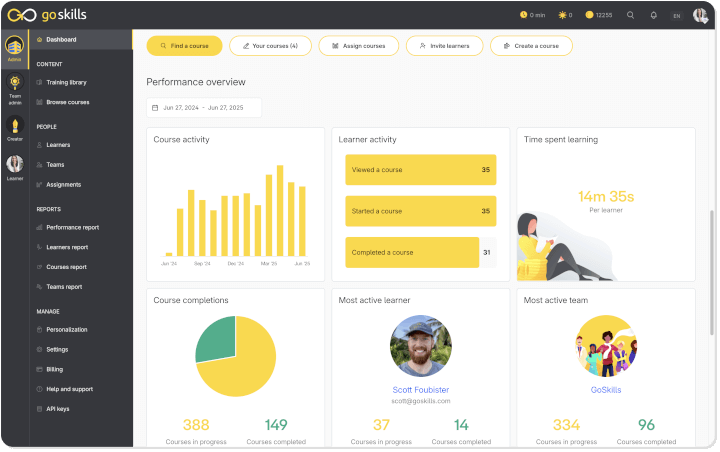
| Pros | Cons |
|---|---|
| Highly flexible and affordable, featuring a widely praised onboarding process for HR managers and course developers. | Operates solely as a cloud-based platform, meaning there's no option for self-hosting courseware. It also offers fewer deep customization possibilities compared to highly technical, DIY solutions like Moodle, though it is significantly less complex to manage. |
Best suited for: Small and medium-sized businesses aiming to quickly establish and administer effective compliance training programs with minimal complexity and fuss.
A better way to train
It's easier than ever to create, track, and manage team training with the GoSkills LMS.
Start for free2. LMS 365
Designed for seamless integration within the Microsoft 365 and Teams ecosystem, LMS365 brings compliance training directly into employees' daily workflow. This software is great for keeping organizations compliant since it automates the delivery and administration of important regulatory content.
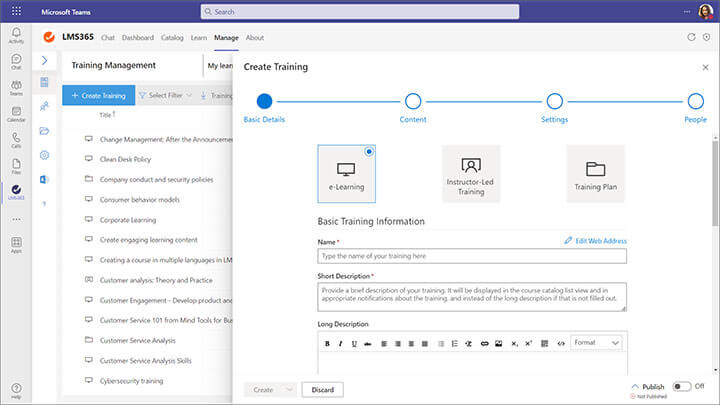
| Pros | Cons |
|---|---|
| Native integration with Microsoft 365 and Teams enhances the "learning in the flow of work" experience. Includes robust tools for automating compliance content, managing certifications, and tracking acknowledgments (like Read & Understood confirmations). | Mobile offline learning capabilities are exclusively available with the higher-tier Professional plan. |
Best suited for: Large enterprises and organizations heavily invested in the Microsoft 365 environment, seeking to streamline compliance training delivery, automate management tasks, and leverage familiar tools for enhanced completion rates.
3. 360Learning
360Learning is a full-featured learning platform that combines LMS, LXP, and collaborative academy capabilities to create engaging compliance training courses. It gives organizations the tools they need to create a culture of continual learning and adherence through collective intelligence.
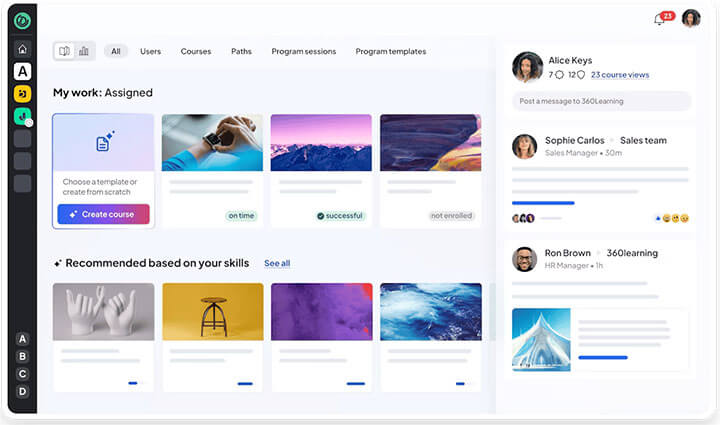
| Pros | Cons |
|---|---|
| Its modern interfaces and AI-driven tools facilitate collaborative learning and simplify compliance training creation and delivery. | May not be the most economical choice if your organization has minimal needs for creating its own internal training content. |
Best suited for: Organizations looking to scale internal training development, leverage collective expertise for compliance content, and prioritize collaborative learning on both desktop and mobile. Ideal for companies seeking robust automation for compliance management, tracking, and certification.
4. Docebo
Docebo is a strong solution for handling large compliance training programs with its flexible, cloud-based Learning Suite. Its strengths include smart automation, making interactive content, and making the certification process easier.
| Pros | Cons |
|---|---|
| Boasts a wide array of free extensions, enhancing capabilities across automation, e-commerce, gamification, and certifications without additional cost. Offers strong automation for reporting and certification management. | Pricing details are not transparent and are only provided upon request, which can complicate initial budget planning. |
Best suited for: Companies needing advanced automation for compliance tracking and certification management, those looking to create highly interactive training (microlearning, gamification), and organizations that value flexibility through extensions.
5. iSpring Learn
iSpring Learn is an easy-to-use but effective online training tool that can meet a wide range of compliance training needs. It lets you put together different types of eLearning content and easily keep track of certification cycles.
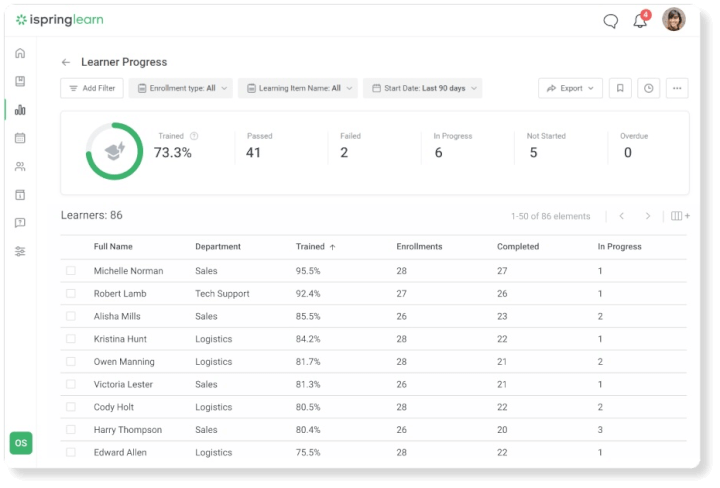
| Pros | Cons |
|---|---|
| Offers a convenient mobile application for both online and offline learning, alongside real-time reporting capabilities for immediate insights into learner progress. | More advanced reporting templates and unlimited performance review sessions are exclusively available in the higher-priced Business plan. |
Best suited for: Organizations that prioritize mobile learning flexibility, require strong reporting on learner progress, and need straightforward tools for building and managing compliance certifications with automated reminders.
6. TalentLMS
TalentLMS provides a user-friendly, cloud-based learning management system designed to streamline compliance training and other educational initiatives. Administrators can quickly manage and change material as rules change thanks to its user-friendly interface and strong reporting tools.

| Pros | Cons |
|---|---|
| Offers unlimited course creation and email support across all pricing plans, providing significant value. Features a user-friendly authoring tool for easy content creation and modification. | Essential automation features, such as course assignment and user management, are reserved for the top-tier Premium plan. |
Best suited for: Smaller to mid-sized businesses looking for an accessible and scalable cloud LMS with a strong focus on content creation, comprehensive reporting, and certification management, particularly those benefiting from a "forever free" starting option.
7. Absorb LMS
Absorb LMS is a complex learning management system that works especially well for thorough compliance training. It does a great job of centralizing control of health and safety training and automating important management tasks like renewals and reskilling, while providing an enjoyable user experience.
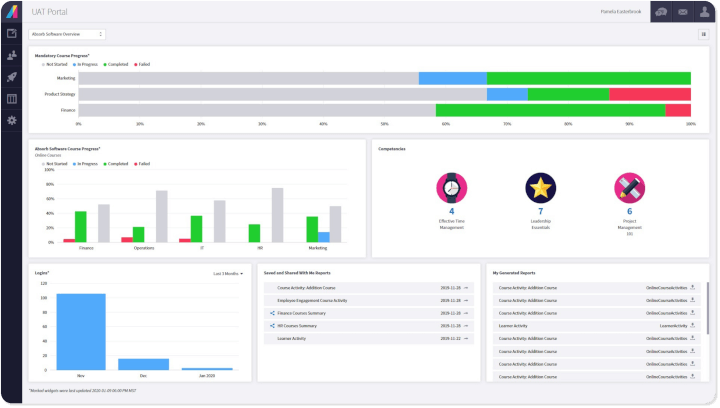
| Pros | Cons |
|---|---|
| Offers an intuitive learner interface designed to make the training experience seamless. Provides robust automation functionalities for managing renewals and reskilling. Customers can also benefit from the Absorb Learning Solutions Team for course design assistance. | Pricing information is not publicly disclosed, requiring direct quotes, which can hinder quick comparisons. |
Best suited for: Companies seeking a user-friendly and highly automated platform for managing diverse compliance training, particularly those with significant health and safety requirements and a need for ongoing reskilling and renewals across a large workforce.
8. WorkRamp
WorkRamp is a flexible, all-in-one LMS that can be used for training both employees and customers. It can also be used to manage strict compliance training. It provides content from leading providers, and uses interactive features to help people remember it.
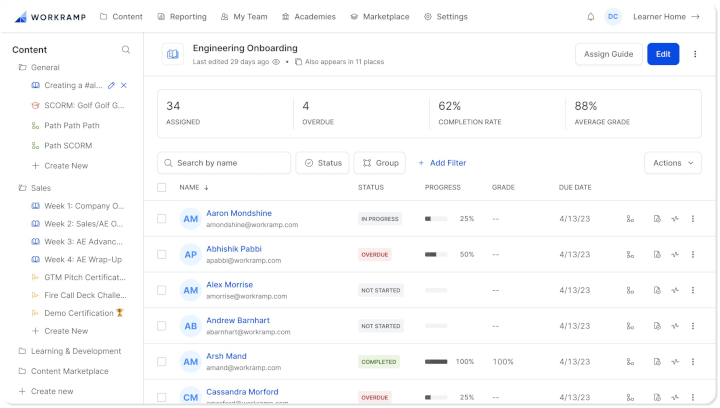
| Pros | Cons |
|---|---|
| Features a highly functional authoring tool and provides convenient access to a variety of off-the-shelf training content. Includes eSignature functionality for formal proof of course completion. | The platform's pricing structure is not publicly disclosed, requiring potential users to request a custom quote. |
Best suited for: Organizations looking for a unified platform for both internal employee and external customer training, those that value microlearning and gamification to enhance engagement in compliance, and companies needing eSignature capabilities for audit trails.
9. Adobe Learning Manager
Adobe Learning Manager is a cloud-based learning tool that integrates learning experiences directly into an organization's digital environment. It can flexibly deliver compliance training online and offline, with AI-powered automation and tailored learning paths.
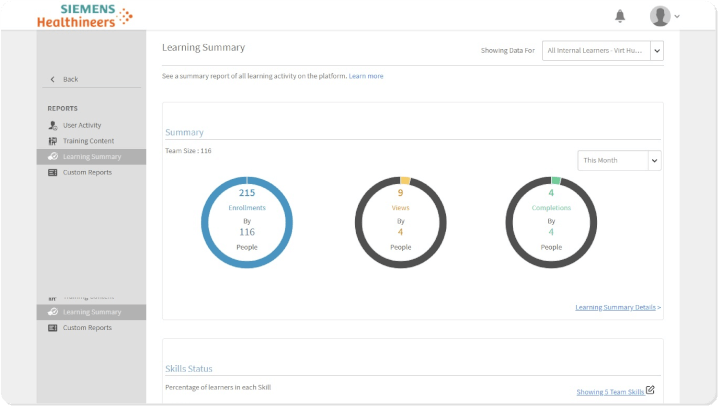
| Pros | Cons |
|---|---|
| Provides excellent integration capabilities with various organizational systems and a wide array of user management tools. Leverages AI for automated tracking, reporting, and personalized learning recommendations. | Specific pricing for different packages is not publicly available, making direct comparisons difficult. |
Best suited for: Enterprises seeking deep integration with their existing digital infrastructure, those valuing AI-powered personalization and automation for large-scale compliance programs, and organizations needing flexible content delivery across web and mobile, both online and offline.
10. Litmos
Litmos delivers a user-friendly and easily deployable LMS, celebrated for its strong security protocols and seamless integration with other business systems. It offers a quick path to compliance readiness through its prebuilt content library and effective reporting.
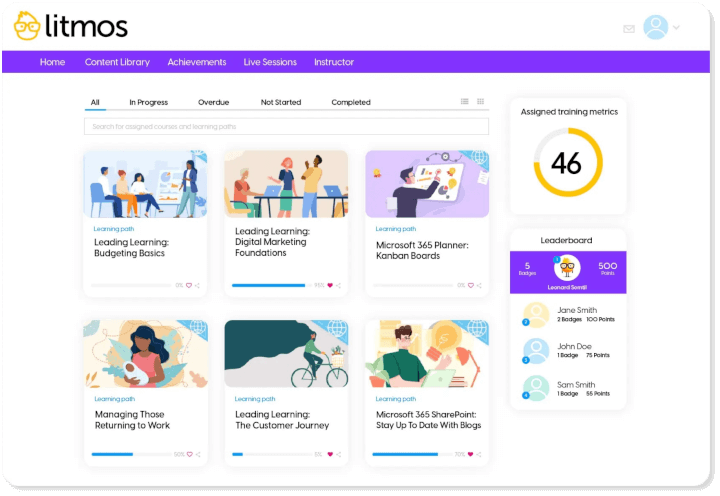
| Pros | Cons |
|---|---|
| Features robust security measures, including data encryption and secure hardware firewalls, and boasts extensive integration options with over 50 CRM tools and APIs. | The platform's native content authoring tool is considered less robust, which could be a drawback for organizations requiring extensive in-house development of process-specific compliance modules. |
Best suited for: Companies prioritizing rapid deployment, high security for sensitive training data, and extensive integration with existing CRM or other business systems. Ideal for those who can leverage pre-built compliance content.
Compliance training success story
The City of Brownsville, for instance, used the GoSkills LMS to update its compliance training. To solve problems like low engagement and long processes, they used an all-in-one compliance training system that made course creation easier, increased participation, and made tracking easier.
With tools like an AI-powered course builder and real-time reporting, they achieved a 99% course completion rate, far exceeding industry averages.
Compliance training made easy
How GoSkills powered the City of Brownsville’s L&D success
But there are more LMS options besides GoSkills. Learn what compliance training is, look at Fortune 500 firms' important indicators, and then explore the top compliance training Learning Management Systems (LMSs) that keep businesses safe and compliant to make an informed decision.
Important LMS features for robust compliance training
A modern compliance training learning management system should be instrumental in automating tasks, boosting knowledge retention, and effectively mitigating compliance risks.
To ensure your learners maximize their engagement and comprehension, a robust learning solution should possess the following key LMS features:
- Advanced course authoring tools: Companies facing strict regulatory requirements need specific solutions for their business. However, many others can gain by producing their own customized compliance training in-house. These modules might cover company ethics, code of conduct, cybersecurity protocols, or human resources guidelines. For example, GoSkills offers pre-designed compliance training templates and AI-powered course builders to streamline content creation.
- Personalized learning paths & role-based training: A good compliance LMS lets you make personalized learning paths that are particular to a role. This focused strategy ensures that employees only get information that is directly related to their job, department, or individual risk profile. This increases engagement by making training content more relevant.
- Comprehensive assessment & analytics: Top-tier learning solutions provide real-time data crucial for compliance oversight. This includes fundamental metrics like course sign-ups and completion rates, along with more granular insights into course performance and individual learner metrics. Platforms like GoSkills offer detailed dashboards to track these elements, ensuring core concepts are understood and compliance mandates are met.
- Mobile & cloud compatibility: Today’s learners require seamless access to compliance training content within their daily workflows. A dedicated mobile application meets the training needs of diverse employee categories. Furthermore, cloud-hosted deployment ensures the platform is always accessible and available with an internet connection, offering maximum flexibility.
- Gamification for enhanced engagement: Leveraging gamified elements like badges, awards, and leaderboards can significantly boost user awareness, alertness, and motivation to learn. Advanced platforms like GoSkills integrate gamification with microlearning delivery styles to maintain learner focus and encourage continuous engagement. Such gamified extras help make mandatory training more appealing and effective.
- Intuitive compliance dashboards & reporting: Effective compliance tracking and management are entirely dependent on accessible data. Your chosen LMS must provide comprehensive reports clearly outlining which learners are compliant and which require follow-up. These dashboards serve as vital tools for administrators to monitor organizational compliance status at a glance.
- Official certifications & automated reminders: To formally acknowledge adherence, the LMS should enable the awarding of official certificates to employees who successfully demonstrate compliance. Critically, the system should also send automated notifications regarding certificate expiration, empowering learners to stay current and ensuring your compliance training records are fully audit-proof.
- Dedicated professional support: Corporate managers aiming to enforce company-wide compliance standards need reliable control over their training content. However, the success of your compliance efforts can hinge on the quality of delivery and ongoing support. Therefore, it's crucial to evaluate the level of professional "after-care" provided with a compliance training platform package. For instance, GoSkills uses dedicated account managers to ensure client concerns and requests are handled efficiently, providing both peace of mind and operational continuity.
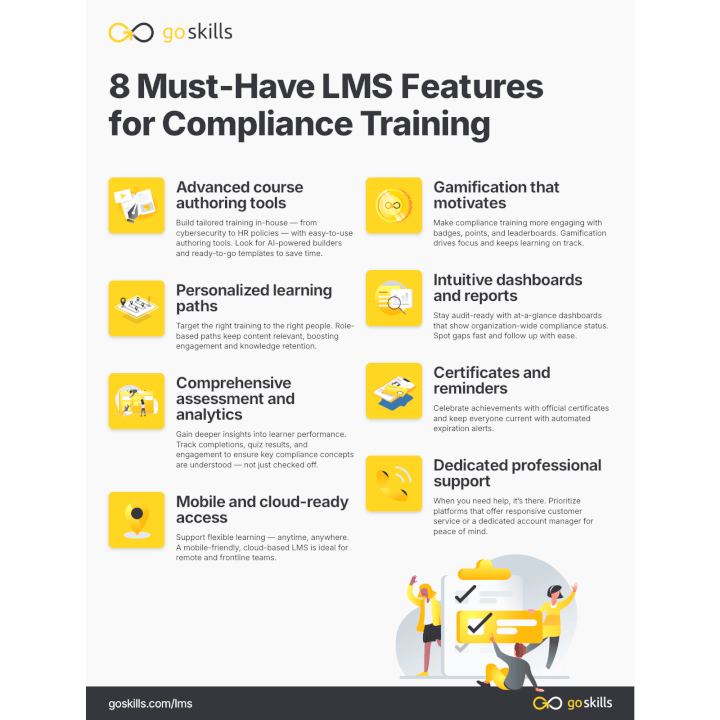
Compliance training LMS FAQs
Since 2013, GoSkills has been refining its learning management system and CPD-accredited courses through a blend of pedagogical expertise and cutting-edge technology. Now in our 12th year, we provide businesses around the world with customizable compliance training platforms and tools tailored to evolving industry needs.
This section combines the latest research in compliance training with real-world insights from companies that rely on GoSkills to meet their regulatory and workforce development goals.
1. What are the most common types of compliance training?
Heavily regulated industries like healthcare and financial services are often obligated to implement stringent, industry-specific compliance training. Examples:
- Regulatory compliance training: essential for businesses operating under strict governmental or industry mandates. Topics such as Anti-Money Laundering (AML) and financial crime prevention are vital for banks and fintech companies. In regions like the E.U., comprehensive data protection (e.g., GDPR compliance) and privacy best practices are indispensable for organizations managing customer information.
- Legal compliance training: this involves educating employees on their rights and responsibilities specific to their roles and the broader legal landscape. These programs often align with regulatory entities that set industry standards, ranging from general best practices to explicit corporate mandates, such as HIPAA in healthcare.
According to a GoSkills poll of 400 global clients, companies without specific industry-driven regulatory mandates often focus their compliance training on these areas:
- Cybersecurity training: cybersecurity compliance is now essential for virtually every business. Given the universal risk of financial account compromise or client data exposure, some form of cyber awareness and prevention training is a must-have across all sectors.
- Workplace safety training: for instance, organizations like the Occupational Safety and Health Administration (OSHA) frequently mandate specific safety training for adherence to established protocols.
- Cultural & ethical training: aims to increase employee awareness of an organization’s values and expectations.
2. Who is usually responsible for compliance training?
In heavily regulated industries, you'll typically find a dedicated compliance officer or an entire department tasked with overseeing the process. They're responsible for navigating complex rules and ensuring the organization adheres to all necessary regulations.
For other companies, the approach tends to be more fragmented. For instance, IT managers often handle cybersecurity training, while HR departments might deliver modules on cultural awareness, ethics, and company policies. This can place significant pressure on Learning and Development (L&D) teams to ensure these diverse training efforts are efficient, impactful, and engaging for employees.
This is precisely where comprehensive platforms like GoSkills become invaluable. A single subscription provides all the tools, templates, and support needed to deliver and monitor a wide range of compliance training with ease, streamlining efforts across departments.
3. How can compliance training be delivered?
Beyond the learning management system, options include in-person lessons, virtual classrooms, social activities, and self-paced reading. For instance, 43% of corporate compliance managers polled by Knowb4 produce training content using Powerpoint.
On the flip side, a 2023 Brandon Hall Group study reported that 90% of organizations use an LMS to support their compliance training. This heavily implies online delivery as the leading option.
4. How often should compliance training be conducted?
The optimal frequency of compliance training is highly dependent on factors like industry regulations, specific risk profiles, and the evolving nature of threats.
According to KnowBe4's 2022 "State of Employee Compliance Training" study, 53% of organizations conduct compliance training either once per year (31%) or once per quarter (22%).
However, the study also showed a clear trend towards continuous learning, with 34% of organizations now training employees at least quarterly or even more often.
This indicates a growing preference for frequent, bite-sized training over a single annual session. As outlined in this GoSkills microlearning guide, this approach helps to maintain continuous awareness, particularly for rapidly evolving challenges like cybersecurity.
5. What are the biggest challenges in effective compliance training?
A primary challenge, cited by 49% of corporate compliance managers, is employee engagement and completion rates. Learners can perceive compliance modules as dry or irrelevant, leading to low participation. Furthermore, proving a clear link between training and demonstrable business outcomes (like reduced errors or improved productivity) remains elusive for many organizations.
Compliance training shouldn’t be painful
Despite the visions that the term “compliance training” might immediately inspire, it’s important for your entire team. With that said, rest assured that it doesn’t need to be a groan-worthy activity for you or your employees. Choose a good LMS, put the right strategies into play, and you’ll deliver compliance training that gets that need-to-know information out there—without boring everyone to tears.




